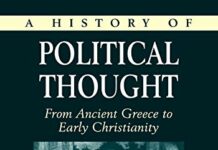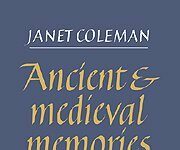
Ebook Info
- Published: 2000
- Number of pages: 320 pages
- Format: PDF
- File Size: 31.20 MB
- Authors: Janet Coleman
Description
This volume continues the story of European political theorising by focusing on medieval and Renaissance thinkers. It includes extensive discussion of the practices that underpinned medieval political theories and which continued to play crucial roles in the eventual development of early-modern political institutions and debates. The author strikes a balance between trying to understand the philosophical cogency of medieval and Renaissance arguments on the one hand, elucidating why historically-suited medieval and Renaissance thinkers thought the ways they did about politics; and why we often think otherwise.
User’s Reviews
Editorial Reviews: Review “This is a very well-informed, thoughtful and scholarly account that is destined to be read closely (and with great profit) by specialists in the field as well as by the students for whom it is primarily intended.” Francis Oakley, Edward Dorr Professor of the History of Ideas and President Emeritus of Williams College “Professor Coleman demonstrates an admirable grasp of the detail and subtlety of the philosophical arguments, and their relation to social and historial circumstances, including trends in wider spheres of thought […] I found the chapter on Plato particularly illuminating and students will find much of ambiguity in The Republic clarified by Coleman’s discussion.[…] Students of specialist courses in Greek, Stoic and early Christian political thought will gain much from this scholarly and erudite book by an acknowledged expert in the field” David Boucher, Cardiff University English Historical Review Vol 117, June 2002 From the Inside Flap Janet Coleman’s two volume history of European political theorizing, from the ancient Greeks to the Renaissance is the introduction which many have been waiting for. It treats some of the most influential writers who have been considered by educated Europeans down the centuries to have helped to construct their identity, their shared “languages of politics” about the principles and practices of good government, and the history of European philosophy. It seeks to uncover and reconstruct the emergence of the “state” and the various European political theories which justified it. This volume continues the story by focusing on medieval and Renaissance thinkers and includes extensive discussion of the practices that underpinned medieval political theories and which continued to play crucial roles in the eventual development of early-modern political institutions and debates. Throughout the author draws on recent scholarly commentaries written by specialists in philosophy, contemporary political theory, and on medieval and Renaissance history and theology. She shows that the medieval and Renaissance theorists’ arguments can be seen as logical and coherent if we can grasp the questions they thought it important to answer. Janet Coleman strikes a balance between trying to understand the philosophical cogency of medieval and Renaissance arguments on the one hand, and on the other, elucidating why historically-situated medieval and Renaissance thinkers, respectively, thought the ways they did about politics; and why we often think otherwise.The volume will meet the needs of students of philosophy, history and politics, proving to be an indispensable secondary source which aims to situate, explain, and provoke thought about the major works of political theory likely to be encountered by students of this period and beyond. From the Back Cover Janet Coleman’s two volume history of European political theorizing, from the ancient Greeks to the Renaissance is the introduction which many have been waiting for. It treats some of the most influential writers who have been considered by educated Europeans down the centuries to have helped to construct their identity, their shared “languages of politics” about the principles and practices of good government, and the history of European philosophy. It seeks to uncover and reconstruct the emergence of the “state” and the various European political theories which justified it. This volume continues the story by focusing on medieval and Renaissance thinkers and includes extensive discussion of the practices that underpinned medieval political theories and which continued to play crucial roles in the eventual development of early-modern political institutions and debates. Throughout the author draws on recent scholarly commentaries written by specialists in philosophy, contemporary political theory, and on medieval and Renaissance history and theology. She shows that the medieval and Renaissance theorists’ arguments can be seen as logical and coherent if we can grasp the questions they thought it important to answer. Janet Coleman strikes a balance between trying to understand the philosophical cogency of medieval and Renaissance arguments on the one hand, and on the other, elucidating why historically-situated medieval and Renaissance thinkers, respectively, thought the ways they did about politics; and why we often think otherwise.The volume will meet the needs of students of philosophy, history and politics, proving to be an indispensable secondary source which aims to situate, explain, and provoke thought about the major works of political theory likely to be encountered by students of this period and beyond. About the Author Janet Coleman is the Professor of Ancient and Medieval Political Thought in the Government Department at the London School of Economics and Political Science. Previously she taught in the Politics Department at Exeter University and for the History Faculty of Cambridge University. She Studied at Yale University and at L’Ecole Pratique des Hautes Etudes, Paris. Her numerous publications include The Individual in Political Theory and Practice (ed. 1996), Ancient and Medieval Memories: Studies in the Reconstruction of the Past (1992), Against the State: Studies in Sedition and Rebellion (1990) and English Literature in History 1350-1400: Medieval Readers and Writers (1981). She is co-founder and co-editor of the international journal History of Political Thought. Read more
Reviews from Amazon users which were colected at the time this book was published on the website:
⭐The book by Coleman is exceptionally well written and covers the main thinkers of the 13th and 14th centuries. She presents the ideas of Aquinas, John of Paris, Marsilius, Ockham, and Machiavelli. In a sense the many arguments discussed by her in the book, all exceptionally clearly presented, lay out the changes occurring at that period with Kings and countries evolving and the papacy in a growing position of power, following through the Avignon papacy of the Bishop of Rome, a bit of a contradiction in terms.She starts with an overview of the key principles that had been some of the underpinnings of the political thought at the time. Two of them are The Donation of Constantine and the Two Swords theory. The Donation was an outright fabrication but it had been used by the papacy for establishing is primacy in all things. In essence the Donation alleged that Constantine had recognized and accepted the domination of the Church, which in a sense had become by this time the papacy. It was also based upon this false document that Henry II of England was “allowed” to give his son John kingdom over Ireland. The two swords principle is the belief that the papacy had both spiritual and temporal powers over people.By the 13th century there clearly was an established power base with the papacy. The Pope had battles various Princes and had tried to hold his dominance over the Kings now emerging in the nations in formation. Thus there was a debate as to what was the role of the papacy and more importantly what were the principles related to governance. As would be argued that councils had primacy over the Pope, then too one could argue that people had primacy over Kings. The Council principle, Conciliar Theory, had re-emerged from centuries of dormancy. Popes had become Emperors in their own right, and in many ways this led to a breaking point, especially with John XXII in Avignon.The discussion of Aquinas is standards but well done. Aquinas is a classic example of the Scholastic School, and he managed to explain Aristotle but to keep from exciting too great a Papal response.John of Paris and especially Marsilius are key players in addressing the limited powers of the Papacy. They rejected the power of the Pope in civil matters and their arguments establish a base for what Ockham was to do next. The author’s presentation of Marsilius is one of the best I have seen. It is clear and delineates the details of his theory. Marsilius saw civil law as distinct from clerical rule and religious law. Marsilius, who is often less well known, set the path for much of what was to come in the 16th century.The presentation on Ockham is clear and insightful. Ockham has many scholars who have examined his work. The recent work by Shogimen is an example. However the author lays out the brilliant arguments of Ockham especially targeted at John XXII in Avignon. Ockham saw the papacy as a purely religious arm. Ockham saw a separation between religion and politics and he was clear in his arguments for the papacy keeping to its own terrain. Ockham at this time was developing his ideas on individualism, one of the very first to articulate individual rights, individual presence, and an acceptance of individuals acting in groups, while retaining their individual character. Whether this is based upon his nominalism or not is still open for debate. Ockham is an interesting player in this area. Marsilius is often a footnote but one suspect that they in some way built upon one another. What drove Ockham was the opulence and arrogance of the Papacy, as exemplified by John XXII. The Papacy had become an interferer in all matters of daily life. It sensed supremacy over rulers and people, not only religious but in their daily actions. Ockham set the path that allowed this to fall apart, albeit over time.Finally she deals with Machiavelli. This also is a well done section and is presents the almost natural transition from Aquinas, to Ockham and to Machiavelli. At this point we see the Aquinas nexus to Augustine and the old Roman way, to the individualism of Ockham and the brilliance of Machiavelli and the Prince.This is a wonderful book and it is especially worth reading as we see a papacy becoming more involved in secular matters. Understanding its prior involvements may help in understanding the strengths and weaknesses of this effort.
⭐I got what I paid for, and the couldn’t be better 🙂
Keywords
Free Download A History of Political Thought: From the Middle Ages to the Renaissance 1st Edition in PDF format
A History of Political Thought: From the Middle Ages to the Renaissance 1st Edition PDF Free Download
Download A History of Political Thought: From the Middle Ages to the Renaissance 1st Edition 2000 PDF Free
A History of Political Thought: From the Middle Ages to the Renaissance 1st Edition 2000 PDF Free Download
Download A History of Political Thought: From the Middle Ages to the Renaissance 1st Edition PDF
Free Download Ebook A History of Political Thought: From the Middle Ages to the Renaissance 1st Edition

